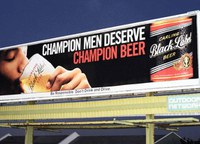
Alcohol ads luring SA youth to drink

Research released by the Soul City Institute for Social Justice this week indicated that young people’s views on alcohol advertising, marketing and availability have a direct influence on their drinking patterns and sexual behaviour.
The multi-country study, which also included India and Tanzania, was conducted by Soul City’s Lebohang Letsela as part of the Strive research consortium, which aimed to tackle the structural drivers of HIV.
She conducted research at a rural village in Mpumalanga and an urban township using the PhotoVoice method in which young people were encouraged to capture their experiences through photographs and captions, including participating in focus-group discussions.
Letsela said young people often visited bars and taverns, even when they had no money, and relied on peers to buy alcohol for them.
They also used occasions such as “Phuza Thursdays” to booze it up.
“Promotional activities such as hosting celebrity events, competitions and discounts also increase the likelihood that young people will go to drinking outlets,” Letsela said in her study.
The research also showed more than 10 alcohol outlets could surround one school.
In an urban area, for instance, it was found there were 147 outlets in proximity to 36 schools and in rural areas, 11 schools were surrounded by 28 shebeens and taverns.
Young males believed that drinking a particular brand would lead to them being successful and young women said flavoured drinks were targeted at them.
Meanwhile, Professor Neo Morojele, deputy director at the SA Medical Research Council’s Alcohol, Tobacco and Other Drug Research Unit, presented his research conducted in Tshwane as part of the International Alcohol Control Study.
Morojele said all age groups had extremely high levels of exposure to alcohol advertisements, including on TV, at movies and on signs outside shops.
Of concern, he said, were the high rates of exposure to advertisements that adolescents are exposed to, including those who did not consume alcohol.
Five years ago, the cabinet approved the gazetting of a draft bill banning alcohol advertising. However, the bill has yet to be legislated.
“We want to lobby that this is made policy as soon as possible,” Letsela said.
The Advertising Standards Authority of South Africa’s dispute resolutions manager, Leon Grobler, said that while alcohol abuse at all levels was a multifaceted problem, the organisation could not comment on the study.
“Our purpose is not to assume the responsibility of the government but rather to fill the gaps between what legislation allows and where advertisers might potentially exploit consumers,” Grobler said.
